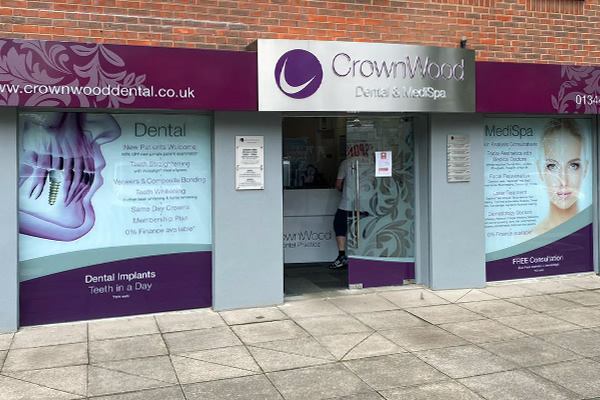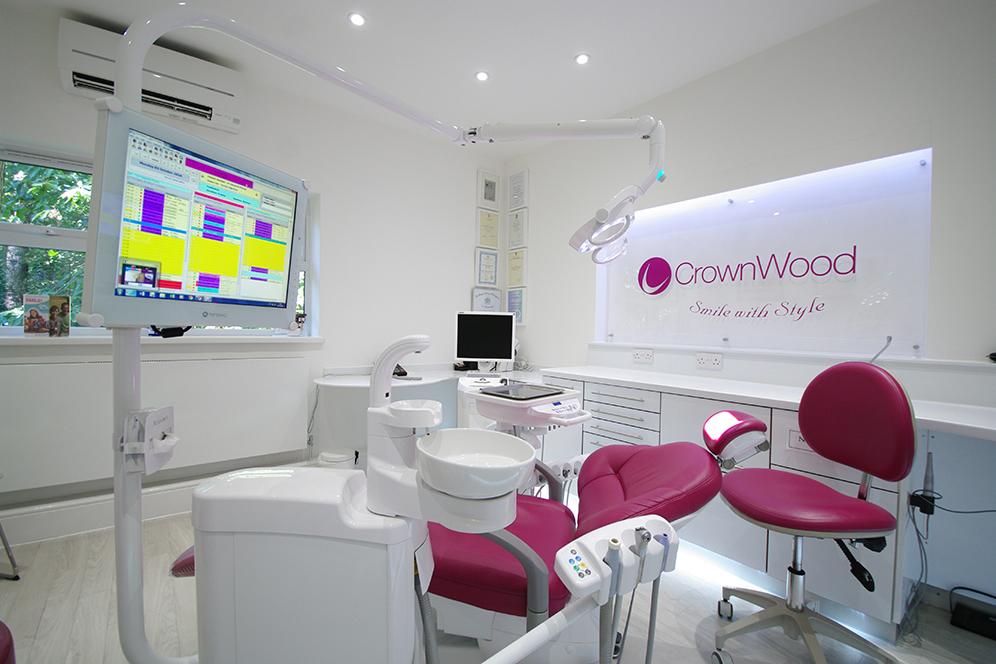If you're looking for a highly rated and experienced dental hygienist near you in Bracknell with a top reputation, our 5* state-of-the-art clinic can help.
Benefit from the expertise of our dental hygiene team who have over 32 years oral hygiene experience and have helped improve the smiles and oral health for thousands of patients across Berkshire.

| Procedure | Private | Membership |
|---|---|---|
| Classic Hygiene (30 mins) | £70 | Inclusive |
| Advanced Hygiene (1 hour) for patients with heavier staining, using our unique airflow for sparkling results | £165 | £150 |
| Intensive Maintenance (1 hour) for patients needing more intensive care for ongoing periodontal gum disease | £280 | £250 |
| Unique Airflow Polish | £25 | £20 |
| Fissure Sealant (per tooth) | £50 | £45 |
We are proud to introduce our superb team of dental hygienists who have over 32 years combined dentistry experience.
Book a dental hygienist appointment with our friendly and caring team and you will be soon benefit from a healthier new smile and improved oral health.
A regular teeth-cleaning routine is essential for good dental health in children. Start brushing your baby's teeth with fluoride toothpaste as soon as the first milk tooth breaks through.
It's important to use a fluoride toothpaste as this helps prevent and control tooth decay. Always check with your dentist about the right choice of toothpaste for your child's age and tooth development.
All children can use family toothpaste as long as you supervise brushing until the age of seven. Brush your child's teeth for about two minutes twice a day: once just before bedtime and at least one other time during the day.
Supervise tooth brushing until your child is seven or eight years old, either by brushing their teeth yourself or watching how they do it.
From the age of seven or eight they should be able to brush their own teeth.
Our dental hygiene treatment includes professionally cleaning the teeth for the patient. This is usually called scaling and polishing.
However, perhaps our most important role is showing you the best way to keep your teeth and gums healthy.
Poor dental hygiene leads to bacteria that build-up on teeth make gums prone to infection. The immune system attempts to curb the infection and the gums become inflamed.
The inflammation continues unless the infection is brought under control. Over time, inflammation and the chemicals it releases eat away at the gums and bone structure that hold teeth in place.
The result is severe gum disease, known as periodontitis. Inflammation can also cause problems in the rest of the body.
Over 80% of the UK population have some form of gum disease and most of these are mild cases and can be treated with a good dental hygiene regime.
For patients with moderate to severe gum disease, you may need to be referred to a Specialist in Periodontics and we are proud that we have Dr Raman Bhardwaj at CrownWood Dental.
Referral to a specialist is necessary where a more detailed treatment of your teeth and gums is required and the treatment options include both non-surgical and surgical management of gum disease, depending on the patient diagnosis.
It’s important to pre-empt the onset of severe gum disease because it can also cause problems in the rest of the body.
The relationship between diabetes and periodontitis is now becoming clear. Inflammation that starts in the mouth weakens the body’s ability to control blood sugar.
People with diabetes have trouble processing sugar because of a lack of insulin (the hormone that converts sugar into energy). Periodontal disease further complicates diabetes because the inflammation impairs the body’s ability to utilize insulin.
Though the reasons are not fully understood, it's clear that gum disease and heart disease also go hand in hand. Up to 91% of patients with heart disease have periodontitis, compared to 66% of people with no heart disease.
The two conditions have several risk factors in common, such as smoking, unhealthy diet, and excess weight. And some suspect that periodontitis has a direct role in raising the risk for heart disease as well.
While many factors contribute to premature or low birth weight deliveries, researchers are also looking at the possible role of gum disease. Infection and inflammation in general seem to interfere with a foetus’ development in the womb.
Bad breath is a very common problem and there are many different causes. Persistent bad breath is usually caused by the smelly gases released by the bacteria that coat your teeth and gums.
However, strong foods like garlic and onions can add to the problem. Smoking is also one of the main causes of bad breath, along with certain illnesses such as nasal and stomach conditions.
Bits of food that get caught between the teeth and on the tongue will rot and can sometimes cause an unpleasant smell. So correct and regular brushing is very important to keep your breath smelling fresh.
The bacteria on our teeth and gums (plaque) also cause gum disease and dental decay. If you see your dentist regularly this will not only help prevent bad breath but will also let the dentist look for and treat these problems.
Plaque is a mixture of bacteria and food. It looks like a soft sticky film on your teeth.
If left undisturbed it will eventually harden to form calculus, otherwise known as tartar, which provides an ideal surface for more bacteria to gather.
The bacteria building up irritate the gums, causing them to look red and puffy (gum inflammation) and it can be quite sore. You may also notice some bleeding on brushing.
This is commonly known as "Gingivitis" – inflammation of the gums. Should the build-up of plaque continue it can lead to Periodontal disease.
During your examination your hygienist will gently feel your gums and if a "pocket" is detected; this means that a "dip" has formed between the tooth and gum line. This pocket should measure less than 3mm in health but if bacteria within plaque has caused early disease then this "dip" will be deeper.
This is more likely to trap more plaque and bacteria meaning that the pocket may well become deeper as the bacteria destroy the gum and surrounding tissues including the supporting bone.
If left untouched and untreated, gum disease may progress leading to severe loss of attachment of tooth to gum and the possibility of a loose tooth/teeth.
Once this has happened treatment is more complex and usually requires referral to a gum specialist called a "Periodontist" for advanced periodontal treatment.
During your visit to the hygienist, they will record an index of how healthy your gums are. This classification system is recommended by the WHO (World Health Organisation).
We have provided a simple version of it for you below:
If you score a code 3 or 4 is it likely that your hygienist will need to do a "deep clean" or RSD (root surface debridement) which means the removal of calculus from the root surface and down into the pocket that exists between tooth and gum.
This should help the pocket to resolve and new healthy gum attachments to occur. Outside factors such as smoking, general health and stress levels will determine how successful the treatment is.
You may require a referral to a Periodontist (available within our practice) if your gum disease is not responding to hygienist treatment or if the disease is very advanced.
Although this treatment should not be painful, occasionally it can be a little uncomfortable. If any discomfort is felt then please say, there are a number of ways for us to help.
If you are having a "deeper" clean, or "root surface debridement" then your hygienist will probably use local anaesthetic to avoid any discomfort.
We have a GDC registered Specialist Periodontist here at CrownWood Dental.
A very important factor on improving/maintaining good oral health is based on what you do at home. Your hygienist can advise you on how best to keep all surfaces of your teeth clean.
All of the products we recommend for use are on sale here at CrownWood Dental. If they are not, then we can order them for you at your convenience.
Your hygienist will be more than happy to help and demonstrate their uses and benefits to you, so please just ask us!
If the film of plaque acquires sugar then the bacteria produce acid which attacks the tooth surface. Minerals are lost from the tooth surface and eventually the bacteria will cause a cavity.
The bacteria will continue to decay your tooth, and unless treated then it may progress to the pulp and cause pain and/or swelling.
One of the ways in which we help prevent dental decay and acid erosion is by looking at foods you take in. The hygienist can help identify any acids/sugars in your diet which may the cause of dental decay/acid erosion and can advise you on how to prevent further damage to your teeth.
"Excellent service. Kiru, helped to settle my nerves and talked me through the process during my hygienist appointment. Very thorough, great advice, kind and caring. Thank you, Kiru."

"Friendly professional staff that put you at ease on arrival and throughout the treatment. Positive improvement in gum condition thanks to hygienist advice."

"If you need a hygenist then I would highly recommend Linda, she is the best I have ever seen"

"Friendly professional staff that put you at ease on arrival and throughout the treatment. Positive improvement in gum condition thanks to hygienist advice."

"Recent visit with the hygienist Harneek was a professional and thorough experience. She was absolutely amazing and made me feel comfortable and let me know exactly what she was doing throughout the treatment.
I was extremely pleased with her level of care and reassurance in calming my nerves . As a hygienist she done a thorough job which I have not experienced before visiting other dental practices.
Very professional and would recommend her services as rated top class !!!!"



